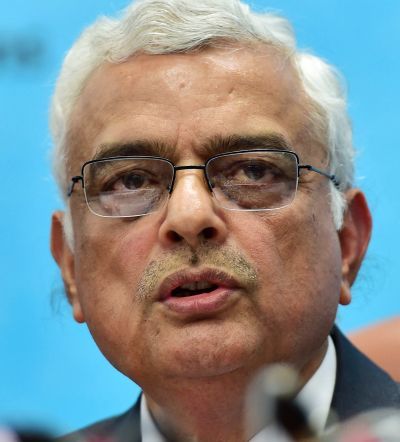 | « Back to article | Print this article |
 Rawat has a short tenure in his new role, but it is likely going to be an eventful one, reports Sahil Makkar.
Rawat has a short tenure in his new role, but it is likely going to be an eventful one, reports Sahil Makkar.
Before joining the Election Commission two years ago, Om Prakash Rawat was known as an unassuming officer who mostly went by the rule book as a civil servant.
Rawat, 64, is an Indian Administrative Service officer of the 1977 batch and belongs to the Madhya Pradesh cadre. He took over as India’s 22nd Chief Election Commissioner from his predecessor AK Joti, inheriting a somewhat controversial legacy.
Rawat was part of the Election Commission’s two contentious decisions. The first relates to breaking from the age-old tradition of announcing election dates of all poll-bound states on the same day. This led to allegation that the Election Commission was providing extra time to the ruling dispensation, the Bharatiya Janata Party, to announce poll freebies in Gujarat.
The second decision was about the disqualification of 20 Aam Aadmi Party legislators for holding office of profit. In the AAP case, Rawat, however, had initially recused himself from hearing the matter after Delhi Chief Minister and AAP leader Arvind Kejriwal accused him and his predecessor, Joti, of being close to the BJP. Rawat later joined the hearing and also denied the AAP charge that the disqualified MLAs were not given a chance to present their side of the story.
The grapevine has it that Rawat owes his Election Commission job to a senior Cabinet minister, who is a Lok Sabha member from Madhya Pradesh.
Rawat had joined the Election Commission on August 14, 2015, and he was the second-most senior election commissioner after Joti, who retired on January 17. Rawat retired as secretary to the Union government in December 2013.
Those who have worked with Rawat, however, say that he was never close to any political party during his stints in the civil services, both at the state-level and the Centre.
“Had Rawat been close to the BJP, he would have become the state chief secretary or got some plum posting from the Madhya Pradesh government post retirement. He was an upright officer throughout his career and all parties respected him,” says an IAS officer belonging to the Madhya Pradesh cadre. “One should not forget that Rawat was part of the same commission which withstood the pressure from the BJP in the Ahmed Patel Rajya Sabha case,” the officer added. The Election Commission had invalidated the votes of two Congress rebel MLAs and declared Patel the winner from Gujarat.
Now, as the CEC, Rawat’s decisions would be closely monitored by his colleagues in the commission and members of civil society. His biggest task would be to supervise the disqualification case of AAP legislators in the Delhi high court and prepare for assembly elections in several states that are due for polls, including Tripura, Meghalaya, Nagaland, Karnataka, Madhya Pradesh, Chhattisgarh and Rajasthan. He would also be watched for his decision on similar complaints relating to MLAs who allegedly hold office of profit in other states.
Officials in the Election Commission say that Rawat wouldn’t resist if the Union government decides to simultaneously hold the general elections and the state assembly elections. “The Election Commission can prepare for the simultaneous elections if adequate money and infrastructure are provided,” says an officer. But for simultaneous polls to become a reality, the Union government would have to first bring amendments to the Constitution, Representation of the People Act and various others laws.
Rawat, who holds a post-graduation degree in physics from the Banaras Hindu University and a post graduate degree in Social Development Planning from the United Kingdom, is said to be the force behind the Election Commission’s plan to devise a social media policy.
Rawat was the first to flag the issue of political parties using public relations firms to shape opinion on social media. He is learnt to have opined that Section 126 of the Representation of the People Act, which prohibits poll campaign in the last 48 hours leading to voting, needs to be modified to take into account the impact of internet and social media during the “silence period”.
Rawat has a short tenure in his new role, but it is likely going to be an eventful one. Chief election commissioners are appointed for a fixed-term of six years or till they turn 65. Rawat would turn 65 in December.